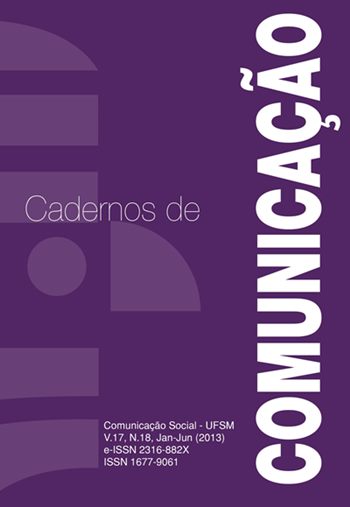CONSTRUÇÕES DE SIGNIFICADOS NO CINEMA: PERCEPÇÕES DO TEMPO NA NARRATIVA DA TRILOGIA DE VOLTA PARA O FUTURO
DOI:
https://doi.org/10.5902/2316882X8952Resumo
O artigo faz uma análise semiológica da trilogia De Volta Para o Futuro (1985, 1989 e 1990), dirigida por Robert Zemeckis. Para isso foi utilizada a teoria de Christian Metz (2006), e dos elementos que compõem a linguagem da cena cinematográfica: foco dramático e cenografia. Os resultados demonstram que o Relógio da Torre, enquanto cenário da trilogia, ajuda a compor uma linha narrativa do filme dando uma unicidade, o que a difere de algumas obras seriadas que não possuem continuidade de narrativa.
Palavras-chave: Semiologia; Tempo; Cinema; De Volta Para o Futuro.
Construcciones de sentido en el cine: la percepción del tiempo en la narración de la trilogía de Regreso al futuro
Resumen
En este artículo se presenta brevemente el análisis semiótico de "tiempo" a través de la Torre del Reloj en la trilogía Regreso al futuro (Back to the Future), dirigida por Robert Zemeckis, en la década de 1980 y principios de 1990. El tiempo como un signo tiene muchos significados en la narración, ya que se trata de viajes en el tiempo. Para el análisis se utilizaron los actuales estudios semiológicos Saussure de Christian Metz (2006), y los elementos que conforman el lenguaje de la escena del cine: enfoque y un paisaje espectacular. Hemos seleccionado las escenas más importantes en los que aparecen: la torre del reloj en las tres películas. Un análisis narrativo se basa en verbal y no verbal. Los resultados muestran que la Torre del Reloj, como escenario de la trilogía, ayuda a componer una línea en la narrativa, una singularidad, que difiere en muchos trilogías que no tienen continuidad. Capaz de demostrar el valor en cines en la narrativa de la película, teniendo en cuenta que permite al espectador a entender la historia a través de diferentes períodos de tiempo.
Palabras clave: Semiología, Tiempo, Cine, Regreso al Futuro.
Constructions of meaning in Cinema: perceptions of time in the narrative of the trilogy Back To The Future
Abstract
This article presents brief semiotic analysis of "time" through the Clock Tower on the trilogy Back To The Future, directed by Robert Zemeckis, in the 1980s and early 1990s. Time as a sign has many meanings in the narrative, because it comes to time travel. For analysis we used the current Saussurean semiological studies by Christian Metz (2006), and the elements that make up the language of film scene: focus and dramatic scenery. We selected the most significant scenes in which they appear: the clock tower in the three films. A narrative analysis was based on verbal and nonverbal. Results show that the Clock Tower, as a setting of the trilogy, helps to compose a line in the narrative, a uniqueness, which differs in many trilogies that have no continuity. Able to prove the value theatrically in the narrative of the film, considering that it enables the viewer to understand the story through different time periods.
Keywords: Semiology; Time, Film, Back To The Future.
Downloads
Downloads
Publicado
Como Citar
Edição
Seção
Licença
Os autores de textos aprovados pelos pareceristas de Cadernos de Comunicação cedem automaticamente e sem qualquer tipo de ônus o direito à primeira publicação do material submetido.







